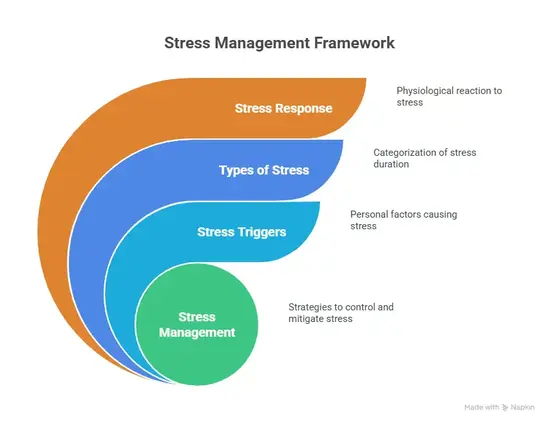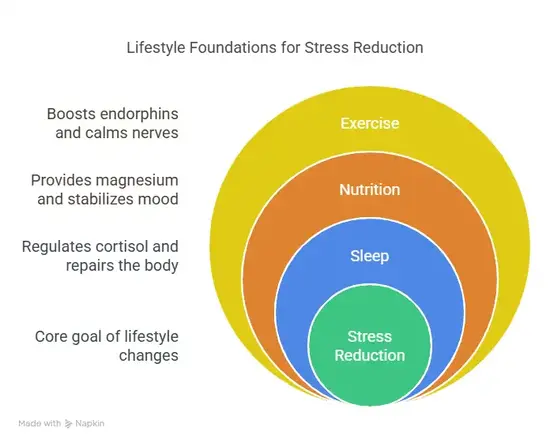In a world where 77% of people experience stress that affects their physical health, mastering stress management tips isn’t just practical — it’s essential for a life of luxury, clarity, and balance. We understand how stress can sabotage your peak performance, relationships, and health.
This comprehensive guide reveals science-backed strategies, practical frameworks, and luxury insights to help you manage stress like an elite. You’ll discover how to recognize stress triggers, build resilience, and adopt daily habits that protect your mind and body for the long term.
Table of Contents
What Is Stress?
Stress is the body’s reaction to any demand or challenge. While it’s natural, chronic stress can lead to insomnia, anxiety, high blood pressure, and even heart disease. Understanding the biology of stress empowers us to recognize it early and manage it effectively.
Why Stress Management Matters in Modern Life
According to the American Psychological Association, chronic stress has become a global epidemic, affecting affluent professionals as much as anyone else. While conventional stress solutions like vacations offer temporary relief, they often fail to address deep-rooted mental fatigue and emotional burnout. High-achievers need more sustainable strategies to protect their well-being without compromising success.
Understanding Stress
The Science of Stress: How It Affects Your Body and Mind
Stress activates the hypothalamic-pituitary-adrenal (HPA) axis, flooding your body with cortisol and adrenaline. This response is useful in emergencies but damaging when it becomes chronic. Prolonged stress suppresses the immune system, impairs cognitive function, and accelerates aging.
Types of Stress: Acute, Episodic, and Chronic
- Acute Stress: Short-term, manageable stress, such as deadlines.
- Episodic Acute Stress: Frequent acute stress; common in perfectionists.
- Chronic Stress: Long-term, harmful stress that persists for months or years.

Recognizing Your Personal Stress Triggers
Track when you feel overwhelmed. Is it during meetings? After digital overload? Knowing your stress triggers is the first step to regaining control.
Self-Awareness for Better Stress Management
Identifying Early Warning Signs of Stress
Early signs include irritability, headaches, muscle tension, and insomnia. By acknowledging these, you can intervene before stress spirals.
Keeping a Stress Journal
A journal clarifies what situations or people consistently elevate your stress. Document your mood, energy levels, and reactions daily.
Assessing Your Stress Level
Use tools like the Perceived Stress Scale (PSS) or professional assessments to quantify your stress levels and adjust your strategies accordingly.
Lifestyle Foundations for Reducing Stress
The Role of Sleep
Deep, restorative sleep regulates cortisol levels and repairs the body. Aim for 7–9 hours nightly, using blackout curtains and tech-free routines.
Nutrition for a Calmer Mind
Eat magnesium-rich foods like leafy greens, nuts, and dark chocolate to combat anxiety. Stay hydrated, limit caffeine, and avoid sugar spikes that worsen mood swings.
Exercise as a Stress Reliever
Regular physical activity boosts endorphins. Try yoga, pilates, swimming, or a brisk walk to calm the nervous system.

Mindfulness and Relaxation Techniques
Introduction to Mindfulness
Mindfulness anchors you in the present, quieting anxious thoughts. Elite performers practice mindfulness daily to maintain focus and emotional balance.
Meditation Practices for Beginners
Start with 5–10 minutes of guided meditation. Apps like Headspace offer structured programs to build a daily habit.
Deep Breathing Exercises
Practice box breathing: inhale for 4 seconds, hold for 4, exhale for 4, hold for 4. This simple ritual reduces heart rate and relaxes the body instantly.
Guided Visualization
Visualize peaceful scenes — a luxury spa retreat, an ocean sunset — to lower blood pressure and soothe the mind.
Building Emotional Resilience
Positive Thinking and Cognitive Reframing
Reframe challenges as opportunities. Instead of “I can’t handle this,” think “This is difficult now, but I’m learning valuable skills.”
Cultivating Gratitude Daily
Keep a gratitude list. Studies show that noting three things you’re grateful for each day enhances long-term happiness.
Acceptance and Letting Go
Perfectionism is a stress amplifier. Embrace good-enough solutions and delegate tasks where possible.
Practical Daily Habits
Time Management
Break tasks into focused blocks, use planners, and prioritize high-impact activities. Avoid multitasking, which increases mental clutter.
The Power of Saying No
Set clear boundaries with colleagues and family. Politely decline requests that drain your energy or clash with your priorities.
Digital Detox
Schedule screen-free hours daily. This protects sleep quality and reduces mental fatigue caused by constant notifications.
Social Support and Connection
How Talking Helps
Sharing your struggles with trusted friends or family can dramatically lighten your mental burden.
Joining Support Groups
Connect with people who share your challenges. This builds accountability and provides practical advice.
When to Seek Professional Help
If stress leads to persistent anxiety or depression, seek help from licensed therapists or counselors.
Stress Management at Work
Setting Boundaries and Managing Workload
Negotiate reasonable deadlines. Batch similar tasks to stay focused and avoid burnout.
Creating a Calming Workspace
Add plants, soothing colors, and ergonomic furniture. A tidy workspace fosters clarity and focus.
Coping with Difficult Colleagues
Stay professional, communicate assertively, and document interactions to protect yourself.
Creative and Fun Outlets
The Benefits of Hobbies
Painting, gardening, or even gourmet cooking provides a mental break from stressors.
Art Therapy and Expression
Expressing emotions through art helps process deep-seated stress.
Music and Dance
Listening to calming music or dancing releases dopamine and lifts mood instantly.
Long-Term Strategies for Sustainable Stress Management
Developing a Personalized Plan
Combine multiple techniques — sleep, exercise, mindfulness — tailored to your triggers.
Tracking Progress
Regularly reassess your stress levels and fine-tune your plan to stay effective.
Building Stress-Resistant Habits
Over time, your new habits become automatic, shielding you from chronic stress.
Conclusion
Top Takeaways:
- Stress is manageable with consistent, mindful effort.
- Daily habits and lifestyle changes offer profound long-term benefits.
- Building emotional resilience and strong social support are non-negotiable.
Let’s be honest — most stress management advice skips the practical details. With these luxury-level stress management tips, you’re empowered to protect your mind, body, and future success. Are you ready to upgrade your daily calm?


